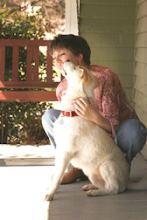Developing a kind of communion with animals has always been a source of joy for me, maybe stemming from how much I loved the movie "Dr. Doolittle" (the original with Rex Harrison). When he sang "If I could talk to the animals, just imagine it," I too imagined the wonder of that possibility.
I enjoy gaining more insight into the minds and emotions of animals and so a program on the National Geographic channel the other night about the development of dogs in the womb caught my attention. The program explored the ways that dogs were domesticated from wolves and how their characteristics differ as they develop during the pregnancy.
The program showed puppies growing in the wombs of a Golden Retriever, a Mastiff and a Chihuahua. I learned that though there are 400 canine breeds, they have all been traced back through their maternal DNA to only three wolves in Asia. Dogs are the most diverse species on the planet and it’s amazing to imagine that a Mastiff who can weigh almost 200 pounds has the same ancestors as that little palm-sized Chihuahua!
What also interests me is that no matter the external differences of any two dogs, they can easily become friends. When my dog Cotton approaches another dog, unless that animal is aggressive or unfriendly, he’s just as thrilled to greet one breed as another. He doesn’t let height or weight or length of ears or the lack of a curly tail cause him to keep his distance. He wants to romp and play with any kind of breed of dog that there is.
Yet look at the track record of us humans. We see just a few surface differences in skin tone or shape of the eye and we can be immediately distrustful. Or we might even go so far as to claim that person to be our enemy before we've had one conversation to get to know their temperament or their hopes and dreams.
I’ve heard Cesar Millan, better known as "The Dog Whisperer," discuss how dogs always live in the present, and, unless severely abused, will not hold a grudge. If only that were true in the human race! At any given time in our world, there are typically about 40 wars being waged and most of those are driven by racial or religious differences.
Thomas Merton, an author and Cistercian monk, once had an epiphany standing on a street corner in Louisville, KY where he looked around and saw that the people around him were "shining like the sun." He wrote, "Then it was as if I suddenly saw the secret beauty of their hearts, the depths of their hearts where neither sin nor desire nor self-knowledge can reach, the core of their reality, the person that each one is in God’s eyes. If only they could all see themselves as they really are. If only we could see each other that way all the time. There would be no more war, no more hatred, no more cruelty, no more greed."
I saw a news clip online the other day about an elephant in a sanctuary who has become best friends with a dog there. The two are inseparable, and the female elephant even stood vigil outside the sanctuary office when the dog was recuperating inside after surgery.
On the day this column will be published, we'll be inaugurating our first President with dark skin, a man who won the election by a surprising majority, partly due to his stated desire to build friendships between the "elephants" and "donkeys" who are typically on opposite sides of the aisle of American politics. When I’m watching that ceremony with friends, I know my heart will swell. And if I had a tail, I bet it would be wagging.
(c) 2009 Sheri D. Kling
